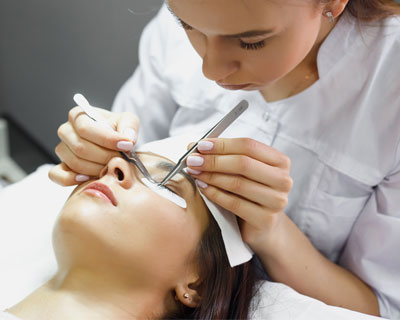People are going to new lengths to make their eyes look special. Eyelash extensions, professionally applied on natural lashes with a semi-permanent glue, are growing in popularity. Ophthalmologists say this cosmetic treatment can be safe, as long as consumers take precautions to protect themselves.
What Are Eyelash Extensions?
There are three types of lash extensions: synthetic, silk and mink. They come in a variety of sizes and shapes. Lash extensions are usually applied by a technician in a beauty salon, using tweezers and a specially formulated, semi-permanent glue. The procedure can take as long as two hours, and your eyes should remain closed for the duration of the application. The faux lashes typically last three to four weeks, falling off as your natural lashes shed.
Are Lash Extensions and Glue Safe for Eyes?
"To keep the eyes safe, lashes should be applied by an experienced aesthetician in a sanitary setting, with chemicals that are safe for your skin," says Rebecca J. Taylor, MD, a Nashville ophthalmologist and clinical spokeswoman for the American Academy of Ophthalmology. The procedure does come with risks, namely: trauma to or infection of the eyelid or cornea; allergic reaction to the glue; and permanent or temporary loss of eyelashes.
Infection can come from inadequate hygiene in the shop or damage to the eye during application. "Remember that a sharp object is being used very close to your eye," Dr. Taylor says.
Ingredients in the glue can cause allergic reactions. In the past, some of these glues have contained the allergen formaldehyde. An allergic reaction can trigger pain, itching, redness and swelling. It may even temporarily interfere with vision. Eyelash extensions and glue are not currently regulated by the U.S. Food and Drug Administration.
Rubbing, tugging or pulling can fracture your natural lashes, and even cause permanent damage to the eyelash follicle. Although rare, extensions can also lead to fibers getting stuck under the eye tissue, which may require surgical removal.
 How to Do Eyelash Extensions the Right Way
How to Do Eyelash Extensions the Right Way
Be sure to look carefully at the shop or salon, the aesthetician and the ingredients of the products before going ahead with eyelash extensions. Here are a few things to look for and ask about:
- Does the salon have a good reputation? How long have they been in business, and do they practice good hygiene? Read reviews and look at before-and-after photos from other customers.
- What training, certification, and experience does the aesthetician have in lash extensions?
- Ask for the glue's ingredient list and check it for allergens. Confirm the expiration date has not passed. Request a spot test on the inside of your wrist before the glue is applied to your eyes.
If you have an allergic reaction to extensions, do not try to remove them yourself, as this could damage your eyes. Do not try to treat the reaction on your own. Doing so incorrectly may make the symptoms last much longer. Instead, go see an ophthalmologist immediately.